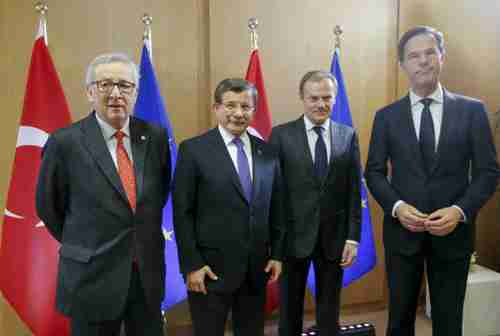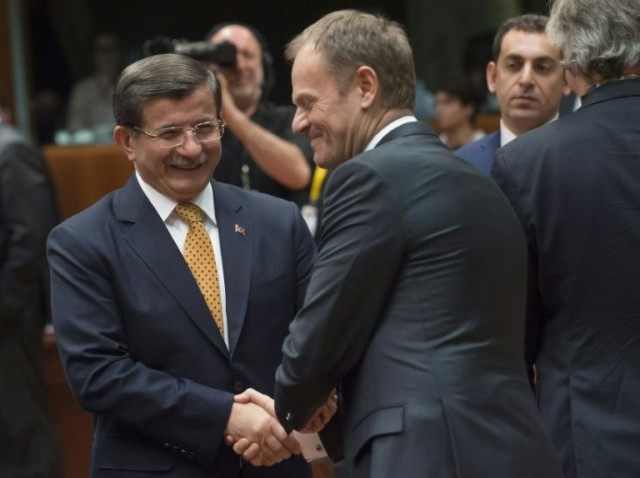This morning’s key headlines from GenerationalDynamics.com
- EU will start returning migrants to Turkey on Sunday
- UN and others object to EU-Turkey deal on humanitarian grounds
- Greece’s refugee camp at Idomeni becomes disgusting and explosive
EU will start returning migrants to Turkey on Sunday

Friday in Brussels: The three EU officials look grim. The only one smiling is the Turkey’s prime minister Ahmet Davutoglu, second from the left. (AFP)
Desperate to find a solution to the migrant crisis, the European Union agreed to numerous demands by the government of Turkey and signed an agreement that few believe will actually solve the migrant crisis.
Some of the terms of the agreement are as follows:
- Starting on Sunday (tomorrow), migrants crossing from Turkey to the Greek islands will be returned to Turkey:
All new irregular migrants crossing from Turkey into Greek islands as from 20 March 2016 will be returned to Turkey. This will take place in full accordance with EU and international law, thus excluding any kind of collective expulsion. All migrants will be protected in accordance with the relevant international standards and in respect of the principle of non-refoulement. It will be a temporary and extraordinary measure which is necessary to end the human suffering and restore public order.
Migrants arriving in the Greek islands will be duly registered and any application for asylum will be processed individually by the Greek authorities in accordance with the Asylum Procedures Directive, in cooperation with UNHCR. Migrants not applying for asylum or whose application has been found unfounded or inadmissible in accordance with the said directive will be returned to Turkey.
- The “One for One” agreement: For every Syrian returned to Turkey, another Syrian will be resettled in the EU from Turkey. It is expected that tens of thousands of Syrian refugees will be resettled in the EU. Notice that the previous point refers to “migrants,” while this one refers to “Syrians.”
- Visa liberalization: Turkish citizens will be able to travel in the EU without a visa by the end of June 2016.
- The EU will pay Turkey 3 billion euros, disbursed as quickly as possible, followed possibly by another 3 billion.
- The EU and Turkey will “reenergize the accession process” to make Turkey a member of the European Union.
German Chancellor Angela Merkel says that the deal will hit the people smugglers’ business model hard and send a “clear message” to dissuade would-be migrants to Europe. BBC and Reuters and Hurriyet (Ankara)
UN and others object to EU-Turkey deal on humanitarian grounds
The Office of UN High Commissioner for Refugees (UNHCR) immediately issued a statement saying:
Today’s agreement clarifies a number of elements. Importantly, it is explicit that any modalities of implementation of the agreement will respect international and European law…
Ultimately, the response must be about addressing the compelling needs of individuals fleeing war and persecution. Refugees need protection, not rejection.
Around 90% of those arriving in the Greek islands say they are fleeing conflict, primarily from Syria, Iraq or Afghanistan. Under international law, each person’s case must be heard on an individual basis, not as a group, because they may have very good reasons for seeking protection.
Turkey is not a full member of the Geneva Convention. It does not offer Syrians asylum, only a lesser form of international protection. And other groups like Iraqis and Afghans don’t even have that option in Turkey. So while returning Syrians is questionable, returning non-Syrians may be even more problematic.
Many officials on the EU side are objecting strongly to the agreement. Hungary’s prime minister Viktor Orbán has said that it must be possible for a country (Hungary) to opt out of receiving any Syrian refugees. Officials in France and other countries fear strong anti-immigrant backlash if visa-free travel is permitted. The deal could also affect the “Brexit” referendum vote on June 23 over whether Britain should exit the European Union. As a separate issue, Turkey will have to recognize the Greek-Cypriot government in Nicosia, which it has not done to date.
Other officials are concerned that Turkey is becoming an increasingly authoritarian government, as president Recep Tayyip Erdogan seeks to amass more and more power. Europeans were especially shocked earlier this month when Erdogan’s government seized the country’s largest opposition newspaper. ( “6-Mar-16 World View — Turkey’s ‘shameful day for free press’ as government seizes Zaman media”)
Some people claim that the EU-Turkey deal may help in the short term, but will have little or no impact on the long term.
There are about 3 million Syrian refugees living in squalid conditions in refugee camps in Turkey. Many of them are determined to reach Europe. If they can’t reach Europe via the Greek islands, then they may take other routes, including a boat trip from Libya across the Mediterranean. Whatever international law permits about returning refugees to Turkey, the law is going to be much stricter about returning refugees to Libya.
Another problem is that the agreement really only covers Syrian refugees. There are thousands of refugees from wars in Iraq and Afghanistan also traveling through Turkey to Greece, and there are refugees from countries in Africa as well. No solution has been proposed for these refugees. United Nations and AP and BBC
Greece’s refugee camp at Idomeni becomes disgusting and explosive
Reports indicate that incidents of violence and fights between groups are increasing in Greece’s refugee camp at Idomeni. Idomeni is a small village on the border with Macedonia, where thousands of refugees who had hoped to cross the border into Macedonia and proceed northward to Germany have been blocked.
Conditions have gotten significantly worse in the last few days because of several days of rain, creating six inches of mud, while portable toilets are becoming increasingly foul.
Greece’s interior minister Panagiotis Kouroumplis says that the Idomeni camp is a modern version of the Dachau camp operated by the Nazis in Germany. He blamed the problem on the European countries that have closed their borders.
After Friday’s refugee deal between the EU and Turkey was signed, German Chancellor Angela Merkel urged migrants to leave the Idomeni camp:
I want to take the opportunity to tell the refugees at Idomeni that they should trust the Greek government and move to other accommodation where the conditions will be significantly better… From there, Greece will put asylum procedures in motion or redistribution to other European countries will take place.
Many refugees have risked everything because they wish to reach a specific country, usually Germany. Moving to the “other accomodation” would require applying to asylum and risking remaining in Greece or being sent back to Turkey. Kathimerini and Lawfare Blog and AP
KEYS: Generational Dynamics, European Union, Turkey, Germany, Greece, Angela Merkel, Ahmet Davutoglu, Recep Tayyip Erdogan, Syria, Iraq, Afghanistan, Africa, Libya, Greece, Idomeni, Panagiotis Kouroumplis
Permanent web link to this article
Receive daily World View columns by e-mail

COMMENTS
Please let us know if you're having issues with commenting.